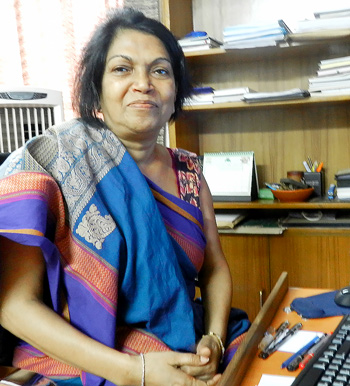Rokeya Kabir: a women’s right activist
Date:
Author: Thaiza Casthilo

Rokeya Kabir was born in 1951, just four years after the partition from India, in the district of Netrakona, situated in the northern part of Bangladesh, near the Meghalayan border of India. “We lived in the outskirts of a small town, my father had considerable amount of land and we grew vegetables, rice and jute,” she remembers.
She recalls that at the time her village was quiet and peaceful: “It is nothing like today, there were no private cars on the countryside. It took me and my siblings 30 minutes walking on unpaved roads to get to school.”
Rokeya was raised by her parents, together with two sisters and six brothers, and at the age of fifteen, she was sent to continue her secondary and higher education in Dhaka. “The good colleges and universities were here, so my family supported me to come to the capital to live in a dormitory in order to continue my studies,” she says. While she was in Dhaka University, in 1971 she participated in the liberation war of Bangladesh.
She grew up to be one of the most famous women activists of the country. In 1986, she founded the Bangladesh Nari Progati Sangha, a women’s organization working to change the lives of women in vulnerable areas while also forging the links between grassroots women and national and international women’s movements.
“In the 1980s, there were several organizations working with middle class women. I wanted to work with women like me, who came from rural areas, but also to work with those living in more vulnerable conditions, so we started going where no one else wanted to,” she explains.
However, for Rokeya, that was not the only reason she started advocating for women’s rights. While she was an adolescent in Netrakona and the tension for the country’s independence started in the late 1960s, her family used to hide members of the left parties and from youth movements in their house to avoid imprisonment and execution. Her four brothers and another sister were also activists.
“My father would tell us that nothing is more valuable than life. Our house used to be full and my mother used to cook for everyone. I remember seeing her and wishing to do something different with my life, to have more choices, to be like those fighting for a better country.”
Bangladesh Nari Progati Sangha is one of the many civil society organizations currently collaborating with UN Women in advocating at the national level for policy and legal reforms and at the community level to mobilize grassroots people through different programs that encompass building women’s capacity and skills to improve their livelihoods.
The activist works in the frontline for women’s and human rights in Bangladesh, with more than thirty years of professional experience in the field. In recognition of her work, she was nominated as one of the “1000 Women for Peace” for the 2005 Nobel Peace Prize.
Bangladesh has created different laws and policies to protect the rights and well-being of women and children and the country is a signatory to the Convention on the Elimination of All Forms of Discrimination against Women, and the Convention on the Rights of the Child.
UN Women is working together with the Bangladesh Nari Progati Sangha by providing safe school and community in four districts of the country to advance the national initiatives to prevent violence against women and girls.
While managing her daily activities and busy meeting schedule, Rokeya also does not save any compliments to express how proud she is of her daughter: “Priyanka lives in Boston now, she is finishing her PhD in public policy, she used to work in Dhaka, but I told her to use all the opportunities she can to continue her education.”
Although Rokeya is proud of her accomplishes and where the country is heading, she plans to continue moving forward in promoting equal rights for the women in Bangladesh. “I know we have a lot to conquer yet. Bangladeshi women should be independent, they should be entitled to the same benefits as men as equal citizen such as inheritance, pension and care for women and equal pay. That is what we will continue to fight for,” she concludes.
About UN Women
UN Women is the UN organization dedicated to gender equality and the empowerment of women. A global champion for women and girls, UN Women was established to accelerate progress on meeting their needs worldwide. For more information about our work in Bangladesh, visit: http://asiapacific.unwomen.org/en/countries/bangladesh